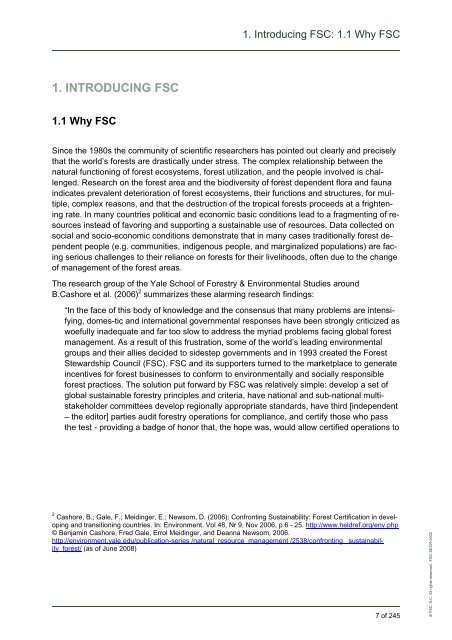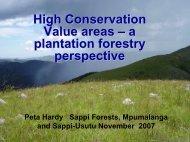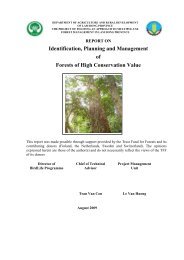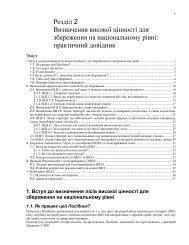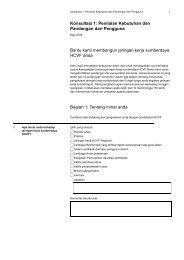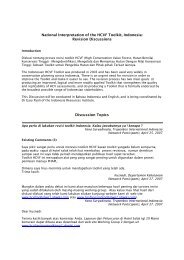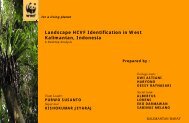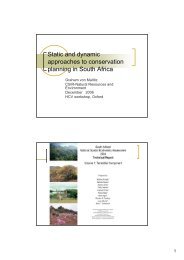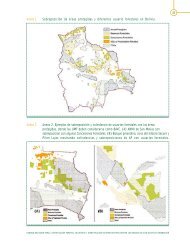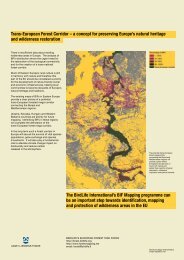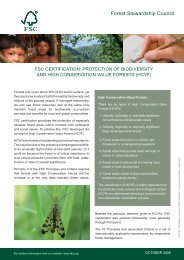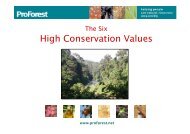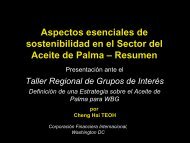FSC reflected in scientific and professional literature
FSC reflected in scientific and professional literature
FSC reflected in scientific and professional literature
Create successful ePaper yourself
Turn your PDF publications into a flip-book with our unique Google optimized e-Paper software.
1. Introduc<strong>in</strong>g <strong>FSC</strong>: 1.1 Why <strong>FSC</strong><br />
1. INTRODUCING <strong>FSC</strong><br />
1.1 Why <strong>FSC</strong><br />
S<strong>in</strong>ce the 1980s the community of <strong>scientific</strong> researchers has po<strong>in</strong>ted out clearly <strong>and</strong> precisely<br />
that the world’s forests are drastically under stress. The complex relationship between the<br />
natural function<strong>in</strong>g of forest ecosystems, forest utilization, <strong>and</strong> the people <strong>in</strong>volved is challenged.<br />
Research on the forest area <strong>and</strong> the biodiversity of forest dependent flora <strong>and</strong> fauna<br />
<strong>in</strong>dicates prevalent deterioration of forest ecosystems, their functions <strong>and</strong> structures, for multiple,<br />
complex reasons, <strong>and</strong> that the destruction of the tropical forests proceeds at a frighten<strong>in</strong>g<br />
rate. In many countries political <strong>and</strong> economic basic conditions lead to a fragment<strong>in</strong>g of resources<br />
<strong>in</strong>stead of favor<strong>in</strong>g <strong>and</strong> support<strong>in</strong>g a susta<strong>in</strong>able use of resources. Data collected on<br />
social <strong>and</strong> socio-economic conditions demonstrate that <strong>in</strong> many cases traditionally forest dependent<br />
people (e.g. communities, <strong>in</strong>digenous people, <strong>and</strong> marg<strong>in</strong>alized populations) are fac<strong>in</strong>g<br />
serious challenges to their reliance on forests for their livelihoods, often due to the change<br />
of management of the forest areas.<br />
The research group of the Yale School of Forestry & Environmental Studies around<br />
B.Cashore et al. (2006) 2 summarizes these alarm<strong>in</strong>g research f<strong>in</strong>d<strong>in</strong>gs:<br />
“In the face of this body of knowledge <strong>and</strong> the consensus that many problems are <strong>in</strong>tensify<strong>in</strong>g,<br />
domes-tic <strong>and</strong> <strong>in</strong>ternational governmental responses have been strongly criticized as<br />
woefully <strong>in</strong>adequate <strong>and</strong> far too slow to address the myriad problems fac<strong>in</strong>g global forest<br />
management. As a result of this frustration, some of the world’s lead<strong>in</strong>g environmental<br />
groups <strong>and</strong> their allies decided to sidestep governments <strong>and</strong> <strong>in</strong> 1993 created the Forest<br />
Stewardship Council (<strong>FSC</strong>). <strong>FSC</strong> <strong>and</strong> its supporters turned to the marketplace to generate<br />
<strong>in</strong>centives for forest bus<strong>in</strong>esses to conform to environmentally <strong>and</strong> socially responsible<br />
forest practices. The solution put forward by <strong>FSC</strong> was relatively simple: develop a set of<br />
global susta<strong>in</strong>able forestry pr<strong>in</strong>ciples <strong>and</strong> criteria, have national <strong>and</strong> sub-national multistakeholder<br />
committees develop regionally appropriate st<strong>and</strong>ards, have third [<strong>in</strong>dependent<br />
– the editor] parties audit forestry operations for compliance, <strong>and</strong> certify those who pass<br />
the test - provid<strong>in</strong>g a badge of honor that, the hope was, would allow certified operations to<br />
2 Cashore, B.; Gale, F.; Meid<strong>in</strong>ger, E.; Newsom, D. (2006): Confront<strong>in</strong>g Susta<strong>in</strong>ability: Forest Certification <strong>in</strong> develop<strong>in</strong>g<br />
<strong>and</strong> transition<strong>in</strong>g countries. In: Environment. Vol 48, Nr 9, Nov 2006, p 6 - 25. http://www.heldref.org/env.php<br />
© Benjam<strong>in</strong> Cashore, Fred Gale, Errol Meid<strong>in</strong>ger, <strong>and</strong> Deanna Newsom, 2006.<br />
http://environment.yale.edu/publication-series /natural_resource_management /2538/confront<strong>in</strong>g_ susta<strong>in</strong>ability_forest/<br />
(as of June 2008)<br />
7 of 245<br />
® <strong>FSC</strong>, A.C. All rights reserved. <strong>FSC</strong>-SECR-0002


